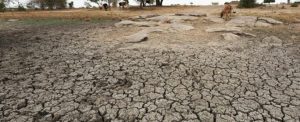State Of The Global Climate 2023: WMO

The World Meteorological Organization (WMO) has released its State of the Global Climate 2023 report, which highlights that the heat content of the world’s oceans reached a record high in 2023.
Key Highlights of the Report:
- The heat content of the world’s oceans reached a record high in 2023, with the highest level of ocean heat content ever recorded.
- While the majority of the world’s oceans are experiencing warming, relatively small regions, such as the subpolar North Atlantic Ocean, are experiencing cooling.
- This cooling is linked to the slowdown of the Atlantic Meridional Overturning Circulation (AMOC), a system of ocean currents.
- AMOC is a system of ocean currents that circulates water within the Atlantic Ocean, bringing warm water north and cold water south.
- Global average sea-surface temperatures (SST) were at a record high in 2023, with several months breaking previous records by significant margins.
- Exceptional heating was observed in various regions including the eastern North Atlantic, the Gulf of Mexico, the Caribbean, the North Pacific, and large areas of the Southern Ocean.
- The global ocean experienced an average daily Marine Heatwave coverage of 32%, well above the previous record of 23% in 2016.
- At the end of 2023, most of the global ocean between 20° S and 20° N had been in heatwave conditions since early November.
- The global mean near-surface temperature in 2023 was 1.45 ± 0.12 °C above the pre-industrial 1850–1900 average, making it the warmest year on record.
- Every month from June to December was record warm for the respective month, and the long-term increase in global temperature is attributed to increased concentrations of greenhouse gases in the atmosphere.
- Glaciers worldwide experienced the largest loss of ice on record, driven by extreme melt in both western North America and Europe.
- Extreme weather events such as heatwaves, floods, droughts, wildfires, and tropical cyclones had major socio-economic impacts on all inhabited continents.
- Tropical Cyclone Freddy in February and March 2023 was one of the world’s longest-lived tropical cyclones with major impacts on Madagascar, Mozambique and Malawi.
- Tropical Cyclone Mocha in 2023, was one of the most intense cyclones ever observed in the Bay of Bengal and triggered 1.7 million displacements across the sub-region from Sri Lanka to Myanmar and through India and Bangladesh, and worsened acute food insecurity.
- Renewable energy generation surged in 2023, with renewable capacity additions increasing by almost 50% from the previous year.




